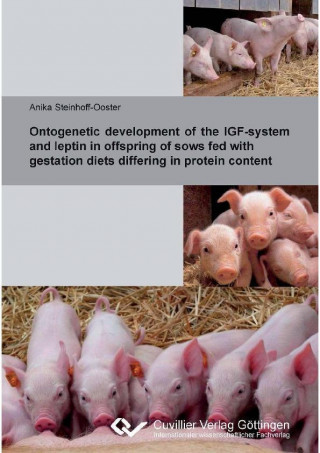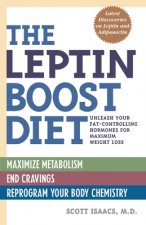
Kod: 12828257
Ontogenetic development of the IGF-system and leptin in offspring of sows fed with gestation diets differing in protein content
Autor Anika Steinhoff-Ooster
The aim of this dissertation was to characterize leptin and the different components of the IGF-system in offspring of sows fed with different protein contents throughout pregnancy and to ascertain long term consequences caused by ... więcej
- Język:
 Angielski
Angielski - Oprawa: Miękka
- Liczba stron: 110
Wydawca: Cuvillier Verlag, 2012
- Więcej informacji o książce

79.63 zł
Zwykle: 83.73 zł
Oszczędzasz 4.10 zł

Dostępna u dostawcy
Wysyłamy za 5 - 7 dni
Zobacz książki o podobnej tematyce
-

Leptin Diet for Women
53.35 zł -

Eulalia!
43.08 zł -12 % -

On the Rampage: Corporations Plundering the Global Village
239.52 zł -

Leptin Boost Diet
66.95 zł -4 % -

Pagan Every Day: Finding the Extraordinary in Our Ordinary Lives
105.31 zł -4 % -

The Samurai Swordsman: Master of War
235.09 zł
Podaruj tę książkę jeszcze dziś
- Zamów książkę i wybierz "Wyślij jako prezent".
- Natychmiast wyślemy Ci bon podarunkowy, który możesz przekazać adresatowi prezentu.
- Książka zostanie wysłana do adresata, a Ty o nic nie musisz się martwić.
Więcej informacji o Ontogenetic development of the IGF-system and leptin in offspring of sows fed with gestation diets differing in protein content
Za ten zakup dostaniesz 46 punkty
 Opis
Opis
The aim of this dissertation was to characterize leptin and the different components of the IGF-system in offspring of sows fed with different protein contents throughout pregnancy and to ascertain long term consequences caused by an inadequate nutritional environment in utero. German Landrace gilts (n=78) were fed gestation diets (~15.4 MJ ME/kg) of either low (LP, 6%; n=26), adequate (AP, 12%; n=26), or high (HP, 30%; n=24) protein content. For sampling at day 94 of gestation, 26 gilts with their fetuses were investigated. At parturition, the offspring of the remaining 52 gilts were cross fostered to nursing sows fed a standard lactation diet. Fetal and birth weight of all investigated offspring were recorded and classified into 2 different fetal body weight classes (Fbwc = or > 0.65 kg) or birth weight classes (Bbwc = or > 1.3 kg). In addition, the litter size of any gilt was classified into two groups (Lsgr = or > 12 piglets). Blood and liver samples from 306 piglets in total were collected. In detail, fetuses of day 94 of gestation (dpc), and piglets at their 1st, 28th and 188th day of life (dpn) were sampled. Blood samples were assayed for IGF-1, IGF-2 and leptin by ELISA and for IGF binding proteins via a quantitative, non-radioactive Western ligand blotting protocol established and optimized herein. Liver samples were assayed for IGF-1 receptor by use of ELISA. The concentrations of leptin in offspring were not affected by maternal diet over all postnatal days. With the exception of dpn 1, the IGF-1 concentrations remained unchanged in response to maternal dietary treatment. Piglets born to mothers fed the LP diet had decreased IGF-1 concentrations compared to piglets born to HP mothers (P < 0.05). Piglets of lower birth weight also showed lower IGF-1 concentrations; IGF-1 and the body weights on dpn 1 were positively correlated. For IGF-2, an association between its concentration and low fetal body weight was observed. In line with previous studies, nutrient restriction as modulator had more pronounced effects on the circulating IGF-1 concentrations than the ones of IGF-2. The concentrations of the IGFBPs were primarily effected by nutrition in utero at the early stages of development. IGFBP-1 was higher in HP fetuses compared to the other two diet groups on dpc 94. For neonatal piglets, IGF-1 and IGFBP-1 were negatively correlated; piglets from LP fed mothers had higher IGFBP-1 values; they also had lower concentrations of IGF-1 than AP and HP piglets. Piglets born to LP fed mothers had lower IGFBP-2 values on dpn 1 and dpn 28; for IGFBP-3 differences related to maternal feeding group were limited to dpn 1: HP piglets had higher IGFBP-3 concentrations than AP piglets. On none of the sampling days, differences between the diet groups were observed for liver IGF-1 receptor content. Neither maternal feeding group nor fetal body weight nor litter size nor sex apparently influenced IGF-1 receptor content on dpc 94 in liver, indicating that different protein diets in utero throughout the entire pregnancy might rather act at the level of the ligand than of the receptor, if the IGF-system is concerned at all. Nevertheless the results of this study show clearly, that all ascertained effects of modified protein diets during gestation were limited to prenatal and early postnatal life. Significant effects resulted predominantly from protein restriction in utero whereas protein excess exerted no or only few effects on all factors tested. Possibly the inadequate protein supply during gestation could largely be compensated during the suckling period and thereafter when feeding was homogeneous in all groups. The lack of persistent effects by maternal feeding on the endocrine systems indicates adaptive processes; moreover, carcass composition data do not support long lasting effects of subtle early endocrine changes.
 Szczegóły książki
Szczegóły książki
79.63 zł
- Pełny tytuł: Ontogenetic development of the IGF-system and leptin in offspring of sows fed with gestation diets differing in protein content
- Autor: Anika Steinhoff-Ooster
- Język:
 Angielski
Angielski - Oprawa: Miękka
- Liczba stron: 110
- EAN: 9783954040612
- ISBN: 3954040611
- ID: 12828257
- Wydawca: Cuvillier Verlag
- Waga: 154 g
- Wymiary: 210 × 148 × 6 mm
- Data wydania: 26. March 2012
Ulubione w innej kategorii
-

Dune
34.83 zł -33 % -

Haunting Adeline
125.75 zł -1 % -

Berserk Deluxe Volume 2
212.54 zł -1 % -

White Nights
15.29 zł -23 % -

Powerless
48.72 zł -11 % -

Atomic Habits
59.19 zł -26 % -

Dune Messiah
46.31 zł -3 % -

Berserk Deluxe Volume 3
218.08 zł -3 % -

One Day
32.61 zł -36 % -

Berserk Deluxe Volume 1
211.73 zł -2 % -

Iron Flame
61.11 zł -28 % -

Surrounded by Idiots
36.74 zł -28 % -

Harry Potter and the Prisoner of Azkaban (Minalima Edition)
170.35 zł -2 % -

Gravity Falls Journal 3
89.40 zł -

Heaven Official's Blessing: Tian Guan Ci Fu (Novel) Vol. 1
88.90 zł -1 % -

The Creative Act
100.17 zł -15 % -

Dune
47.31 zł -23 % -

Hunting Adeline
126.45 zł -4 % -

A Little Life
47.01 zł -14 % -

Children of Dune
46.71 zł -2 % -

Heaven Official's Blessing: Tian Guan Ci Fu (Novel) Vol. 2
77.72 zł -14 % -

Bungo Stray Dogs, Vol. 8 (light novel)
65.74 zł -4 % -

Percy Jackson and the Olympians 5 Book Paperback Boxed Set
185.45 zł -4 % -

Solo Leveling, Vol. 1
86.68 zł -3 % -

The Prisoner's Throne
44.90 zł -12 % -

Court of Thorns and Roses
43.39 zł -15 % -

Cry Baby Coloring Book
47.31 zł -1 % -

Fourth Wing
73.89 zł -12 % -

Icebreaker
35.13 zł -26 % -

Berserk Deluxe Volume 6
218.08 zł -3 % -

Avatar, the Last Airbender: The Kyoshi Novels (Box Set)
169.14 zł -2 % -

The 48 Laws of Power
100.88 zł -12 % -

House of Leaves
124.04 zł -3 % -

Twisted Lies
37.75 zł -26 % -

Dune Messiah
49.63 zł -13 % -

No Longer Human
58.49 zł -5 % -

48 Laws Of Power
61.11 zł -28 % -

Twisted Games
37.75 zł -26 % -

Caraval Paperback Boxed Set
175.49 zł -3 % -

Solo Leveling, Vol. 2
80.34 zł -17 % -

Open Circuits
169.55 zł -2 % -

Berserk Deluxe Volume 5
156.46 zł -30 % -

Heaven Official's Blessing: Tian Guan Ci Fu (Novel) Vol. 3
77.22 zł -14 % -

Berserk Deluxe Volume 4
201.26 zł -11 % -

Court of Mist and Fury
36.54 zł -26 % -

SOLO LEVELING V08
88.39 zł -2 % -

English File Upper Intermediate Multipack A (4th)
100.57 zł -

CHAINSAW MAN V14
42.68 zł -23 % -

Before the Coffee Gets Cold
33.92 zł -26 %
zadowolonych klientów
Od roku 2008 obsłużyliśmy wielu miłośników książek, ale dla nas każdy był tym wyjątkowym.
Copyright! ©2008-24 libristo.pl Wszelkie prawa zastrzeżonePrywatnieCookies


 21 milionów książek
21 milionów książek Dostawa 10.99 zł
Dostawa 10.99 zł (32) 444 93 66 (8-15.30h)
(32) 444 93 66 (8-15.30h)